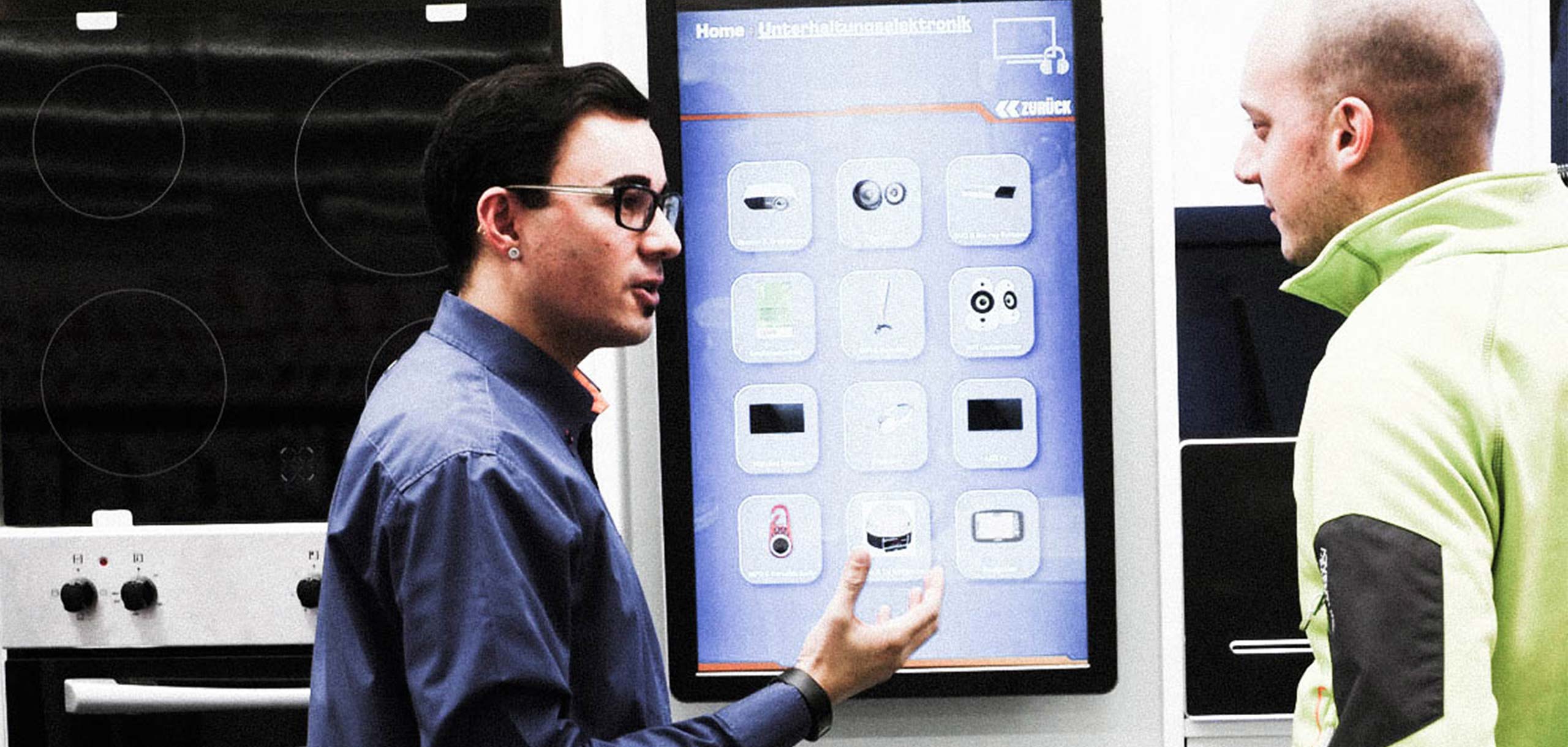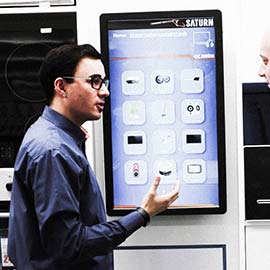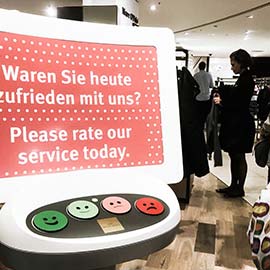The digital transformation
of employees
If you type the words „digital transformation" into the google search bar you will get 12.900.000 results, with „Industry 4.0" you will receive 38.900.000 search results, and if you search in "Internet of things" you will be presented with a whopping 199.000.000 search hits. One can therefore reasonably assume that things are happening.
News about the digital revolution, robotization of working processes and artificial intelligence that are increasingly permeating our everyday lives, keep bombarding us via various channels.
Constantly omnipresent too is the term „digital disruption", posing a massive threat to proven business models, or much rather individual value-adding chains and in consequence also representing a merciless job killer. Disruption signifies creative destruction - a nightmare for many established businesses, for the „start-up scene", however, it is commonly understood as an economic term, more like a promising awareness of life. Digitalization therefore isn't something that is going to happen at some point - no, digitalization has already begun, is happening right now and will continue to happen tomorrow and in future.
The only question that remains to be answered is: what does all that mean for the individual employee? Up to now we have largely digitalized information that has come about as a result of the interactions of people and that was meant to be useful. But what is going to happen, if even employees are supposed to be digitally transformed and what is going to change for the individual in consequence? Are employees simply going to be replaced by computers or robots and thus being transformed into a "digital synergy"?
The two terms "digital" and "transformation" are both clear indications for the fact that they define a process of transformation. Digital transformation represents a continuous journey through the digital age, yet simultaneously stands for the achievement of the highest level of digital knowledge which is based on the actual digital competence and utilisation within a company, too. The ultimate objective is the transformation and further development of business models, corporate processes and customer experiences - in other words the digital return of „ King Customer"in conjunction with new information and communication technologies. Therefore, a strong orientation and focus on the customer as the necessary starting point for the digitalization of processes. He who does not focus on the customer will lose his clientele to his competitors who are only a mouse-click away in their digital world. Well, so much for the theory!
Many businesses perceive digital transformation as an obligation in order to be able to keep up with competitors, only a few view it as a valuable tool for differentiation. Yet, it puts the focus on the value-adding edge for the customer and digital products or services could well be seen as a meaningful addition, complementing the physical product and service range in the corporate world.
Unfortunately and all too often, online shopping is still considered as some sort of „publicly accessible merchandise management system", lacking all the attributes of knowledge transfer and consultancy. In order to counter this perception more and more companies have over recent years developed a multi-channel strategy for the purpose of offering customers an optimally interlinked client experience, online as well as offline. Researching the varying „customer journeys"and the appropriate „customer experience management" has therefore significantly gained importance.
In an Oracle survey business executives have expressed concern that they might lose up to 20% of potential turnover due to the absence of a solid and consistent customer process. For this reason it doesn't come as a surprise that 97% of business leaders consider it critically important for their businesses to offer their clients a positive customer experience. 93 % of corporate executives placed on record that „customer experience „would be one of their three top priorities in the next two years. These figures speak for themselves and prove that enhancing the digital customer experience is of paramount importance in business. In this regard, all experts unanimously agree that the employees of a business are the key to a successful digital transformation. Why? Even in the digital age businesses depend on a content customer base for their economic survival and motivated, friendly as well as competent employees therefore play a key role.
According to a CSC Economist Survey 54 % of businesses interviewed do not regard the improvement of customer experiences as the decisive factor but consider the improvement in efficiency as primary corporate objective in the digital transformation process. In other words, one would be better placed focussing on enhancing operational excellence for the purpose of achieving shorter time-to-market, more productive employees, more streamlined processes and a more effective deployment of resources. Besides, one of the greatest misunderstandings with regard to digital transformation is often expressed in the fact that it is understood as simple transfer of existing processes, activities and mindsets onto digital channels. That way digital transformation merely becomes a huge software project and the employee appears to take on a very minor role in this digitalized world. However, this impression is vastly misleading. The final implementation for the customer's benefit in the daily business interactions will become more important than ever, and, in addition, it is a known fact that the entire infrastructure for the digitalization process has to be generated, maintained and continuously adapted by the employees.
It is also important to acknowledge that customers have since taken to actively shaping the value-added chain. It is much more than the mere distribution of products and services from business to customers. It is more a case of understanding the needs, of co-creatively designing customer value, of generating consumer desire, ultimately of ensuring an individually unique customer experience.
The human factor is therefore going to play - perhaps a slightly different - yet more and more important role. "High-tech and high touch! "- is what this prognosis is called, in reference to the employee's new role in a digitalized business environment. Despite all the benefits of digitalization, customers do not want to miss out on personal contact in their daily interaction with businesses at all the important touchpoints. Quite the contrary! And precisely for this reason it is important that these interactions between employees and customers must be properly planned and well thought-out, clearly defined, customer-orientedly designed and practically implemented so that, together and in synergy with all digital trends, a business can consistently guarantee a professional customer experience.
How important this fact actually is, is clearly demonstrated by the current DGB Index. 54% of employees interviewed confirmed that due to digitalization their workload has since increased; only 7% report of a decrease on the other hand. However, it isn't "technology" that's brought about the increase or decrease in workload and added stress, but the "how?" and "what for?" of the implementation that are at the core of the negative or positive effects on the daily routines, services and ultimately also the customer experience.
The digital transformation - like almost all historic, evolutionary advances - is fuelling many fears, not only in the higher echelons of corporate businesses, but also among their employees. Of course, since it is human beings again that are directly affected, either because their conventional chores and activities are no longer in demand or because they are simply no longer required. One only needs to remember headlines on the very same topic that already existed back then in 2012: „ Kodak has gone bankrupt - a pioneer in photography failed to spot the digital revolution. The technology leader with decades of experience missed the opportunity to reinvent itself. "The average life expectancy of an enterprise was around 75 years in 1940 - nowadays it has shrunk to just about 15 years - according to a survey conducted by the US economist John Hagel."
Prof. Weinberg from the Hasso-Plattner-Institute has already perfectly outlined this change: "In future we will no longer centre around hierarchies and fields of expertise, but we will focus more on building flexible teams with a broader cross-sector horizon of knowledge who will be prepared to tackle projects jointly, in a highly complex and more sophisticatedly networked working culture. Figuratively expressed it translates to: Farewell to the Brockhaus Encyclopaedia thinking. For me, this lexicon is a metaphor for the past and linear thinking with its classic categorizing. In future companies will be faced with challenges that can no longer be solved by individual departments. Classic conciseness and orderliness, the familiarity of the tried and trusted and the comfort zone will disappear."
Digital transformation will open up a host of new opportunities despite all uncertainty. However, it will require new knowledge and skills. Yet any initiative towards digital transformation will necessitate training in order to familiarise employees with the new digital tools and work processes, and businesses should therefore facilitate practical training programmes. In the wake of growing digitalization employees are taking on new areas of responsibility and are no longer just service providing members of staff but increasingly assist with customer orientation, decision-making and even lifestyle consultancy of customers. It has therefore become increasingly important to adequately prepare employees for their new role and their new tasks.
Digitalization does not create an entirely new environment, but one of endless combination possibilities and more access points and ways in. It's not about whether online OR offline, but it's all about a new understanding and innovative and new look at one's own business concept instead. Digitalization makes it transparent. Enterprises and their employees will have to deal with their most important resource, the customer that is, in an entirely new and different way. Not in a subservient manner but confident and effortlessly sovereign. Just as Arthur Clarkes marvellously quoted: „Any sufficiently advanced technology is indistinguishable from magic." Or as put in a nutshell by Walt Disney: „Magic is something you make!".



























